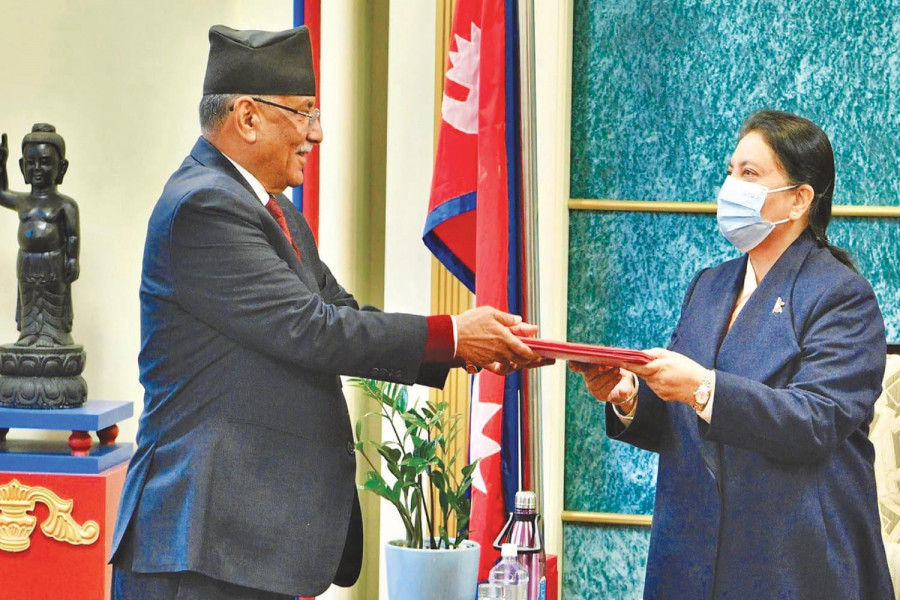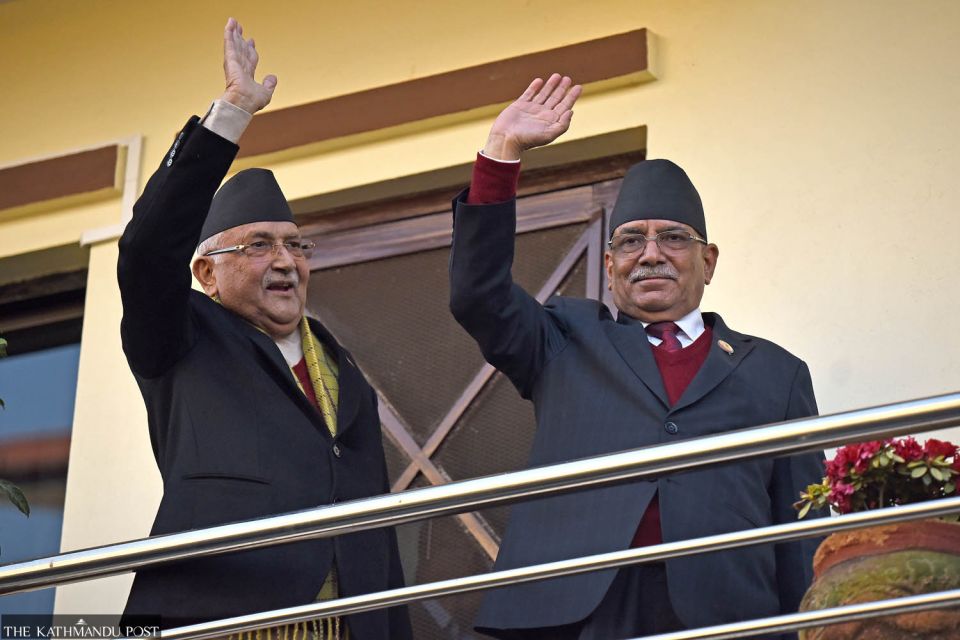
Sher Bahadur Deuba, a veteran of manoeuvring hung parliaments to his advantage, got outfoxed on Sunday afternoon by his bete noire, KP Sharma Oli.
Not only did Oli succeed in getting Pushpa Kamal Dahal anointed as the prime minister, a move which weaned Dahal away from the Congress-led alliance, he also now gets to have his own candidate for the head of the state and the Speaker of the House of Representatives along with plum ministries and a majority of the provincial chief ministers.
Until Sunday afternoon, a Nepali Congress-led coalition led by Deuba was the favourite to form the next federal government.
The Oli masterstroke means that he will now get to pull the strings of power.
“Until the last hour, the UML was not getting anything but now it will have the President and Speaker from the party, apart from the chief ministers of at least four provinces. It is a political triumph for Oli,” Jhalak Subedi, an analyst of left politics, told the Post.
“Even though Oli is not taking the helm of government, he will have the pole position in steering the government, checking the Dahal-led administration through the President and Speaker.”
President Bidya Devi Bhandari appointed Dahal as the new prime minister of the country as per the Article 76 (2) of the constitution. Dahal will be heading the government for a third time.
Article 76 (2) says the President appoints as prime minister a member of the House of Representatives who is able to command a majority in Parliament with the support of two or more parties. On December 18, the President had given the parties a week to show majority to claim government leadership. Dahal presented the claim just before the President’s deadline ended. “President Bidya Devi Bhandari has appointed Pushpa Kamal Dahal as per Article 76 (2) of the Constitution of Nepal,” reads a statement issued by Sheetal Niwas.
Dahal will take charge as prime minister after taking the oath of office and secrecy from President Bhandari on Monday afternoon.
Despite getting appointed prime minister with an overwhelming majority, Dahal will now have to win a vote of trust from the lower house within 30 days as per Article 76 (4) of the constitution. “The prime minister of a coalition government must prove that he has the confidence of the House,” Mohan Acharya, a constitutional lawyer, told the Post. If he fails to win the confidence of the House, then a new process for government formation will begin.
Earlier on Sunday, a meeting of the UML, the Maoist Centre, the Rastriya Swatantra Party, the Rastriya Prajatantra Party, the Janamat Party, the Janata Samajbadi Party and the Nagarik Unmukti Party reached an agreement to make the Maoist Centre chair Pushpa Kamal Dahal prime minister for the first half of the five-year term of the new parliament.
“The dramatic turns of events at the last hour frittered away the chances of government formation under a Congress-led alliance,” Gynandra Bahadur Karki, a Congress leader close to Deuba, told the Post. “Everything was under the alliance’s control, but something dramatic happened, all of a sudden.”
“Forging an electoral alliance with one party and allying with another in the post-election period is a serious breach of coalition culture,” said NP Saud, another leader close to Deuba.
Dahal had reached Balkot to meet UML chair Oli after Nepali Congress President Deuba refused to hand over the prime minister’s post to him. They were later joined by key leaders of other parties. With Congress refusing the prime minister’s job to Dahal, Dahal told Deuba that his party could no longer remain in the Congress-led coalition.

CPN-UML chair KP Oli and Maoist Center chief Pushpa Kamal Dahal wave at their supporters from the balcony of Oli’s residence at Balkot in Bhaktapur after reaching a power-sharing deal, on Sunday afternoon. Dahal was appointed prime minister in the evening.
The parties in the new coalition are yet to discuss power-sharing, a complicated endeavour with multiple stakeholders. “Though Oli has said the UML will claim President and Speaker, there has been no agreement among the parties in the new alliance,” said Dev Prasad Gurung, general secretary of the Maoist Centre. “We had no option other than to join hands with the UML after Deuba refused to budge.”
UML Deputy General Secretary Prithvi Subba Gurung informed that the two communist parties have reached an understanding to head both the government and the House of Representatives by turns. “At first, the Maoist party will head the government and the UML will head the parliament. In the next half, our party will helm the government and the Maoist side will lead the House,” Gurung told the Post. “Our party will get the presidential post for the entire term.”
UML’s Gurung and Maoist General Secretary Dev Gurung were the first ones to float the idea of a left alliance immediately after the November 20 polls.
The Congress-led four-party ruling alliance was formed to oust Oli’s government in 2021. The formation of the new ruling coalition is a political victory for Oli and proves wrong the doomsayers who were predicting his reduced role as an opposition leader in the new parliament.
Khagendra Prasai, another analyst of Nepal’s left politics, however, warned that the new ruling alliance wouldn’t last. “It is less a political win for Oli, and more a loss for the Congress,” Prasai said. “I believe the parties were in regular touch with each other after the November 20 polls and so it’s not an agreement that has come out of the blue.”
Dahal now has the support of 169 members including 78 from the UML, 32 from the Maoist Centre, 20 from the Rastriya Swatantra Party 20, 14 from the Rastriya Prajatantra Party, 12 from the Janata Samajbadi Party, six from the Janamat Party, and four from the Nagarik Unmukti Party. He also secured the backing of independent lawmakers Prabhu Sah, Kiran Kumar Sah and Amresh Kumar Singh.
Asked how things changed abruptly, senior leader of the Unified Socialist and former prime minister, Jhalanath Khanal, said it mostly owed to Deuba’s failure to honour his promise.
“In a coalition meeting, Dahal had asked Deuba to abide by his assurance that the Maoist Centre chair would get to lead the government first, but Deuba said his party had refused to agree to such a deal,” former prime minister Khanal told the Post. “Deuba should not have promised Dahal without consulting his leaders.”
The Unified Socialist, which was formed from a UML split, will suffer the most by Dahal’s jumping of the ships, as the UML top brass is not ready to accommodate Unified Socialist in the new alliance. “We will evaluate today’s developments and make a concrete decision about what to do next,” said Khanal, adding that his party would now focus on strengthening its base nationwide.
“Except for three parties—the Congress, the CPN (Unified Socialist) and the Loktantrik Samajbadi Party—Dahal has the support of all other parties in parliament,” Tika Dhakal, communication expert to the President, told the Post. “Dahal’s swearing-in is scheduled for 4 pm, Monday.”
The new parties that emerged from last month’s polls—the Janamat Party, the Rastriya Swatantra Party and the Nagarik Unmukti Party—have also decided to join the government.
Amid the unprecedented twists and turns of the events, CK Raut-led Janamat Party changed sides at the last minute and joined UML and Maoist Centre in the government formation process. The fourth-largest force in parliament, the Rastriya Swatantra Party, also decided to join the new government under the UML and the Maoist Centre. The Nagarik Unmukti Party, which was in touch with the Deuba-led coalition, has also agreed to the same.
Janamat Party General Secretary Chandan Singh said even though they had agreed to join the Congress-led coalition, Deuba did not try to bring them on board, so they had been compelled to leave all options open. “The main point was that we needed to quickly decide on a new government. A deadlocked government formation process would have helped no one. And so we did what we needed to in order to break the deadlock,” Singh told the Post.
“About claiming ministries, we will discuss the issue in our party. We hadn’t had the time to think of that,” Singh said.
With the coming together of the UML and the Maoist Centre, the Congress has also lost the chance to form governments in the provinces.
Now, the new alliance led by the UML has a comfortable majority in all the seven provincial assemblies as well. In Province 1, of the total 93 seats, it has 60 seats. In the Madhesh province, the new alliance has 62 of the 107 seats. Even in the Bagmati provincial assembly where the Nepali Congress has most seats, the new alliance is in a comfortable position in forming the government, with 61 of the 110 provincial seats.
Likewise, in Gandaki province, the new alliance has 32 of the total 60 seats, while it has 52 of the 87 seats in Lumbini province. In Karnali province, Maoist Centre is the largest party after Nepali Congress. There, the new alliance has 24 of the total of 40 seats. In Sudurpaschim province, the new alliance has 29 of total 53 provincial seats.












